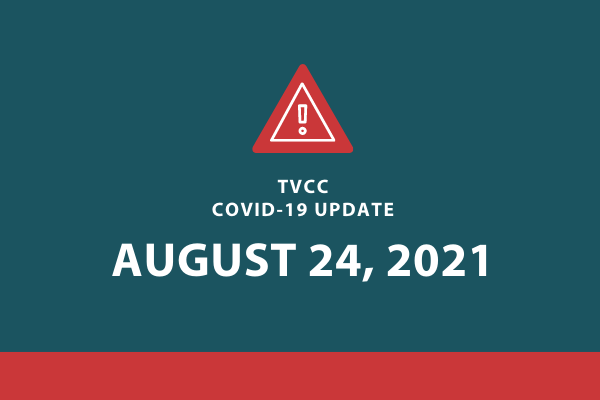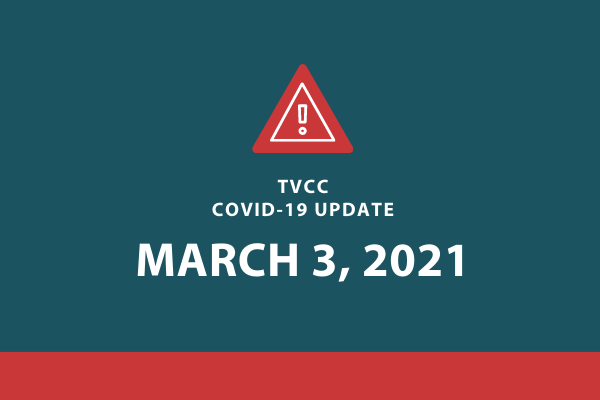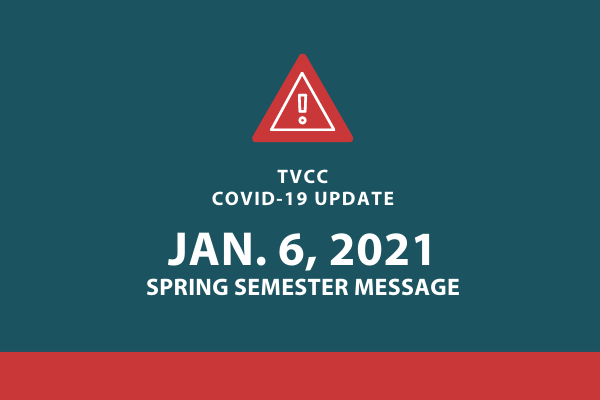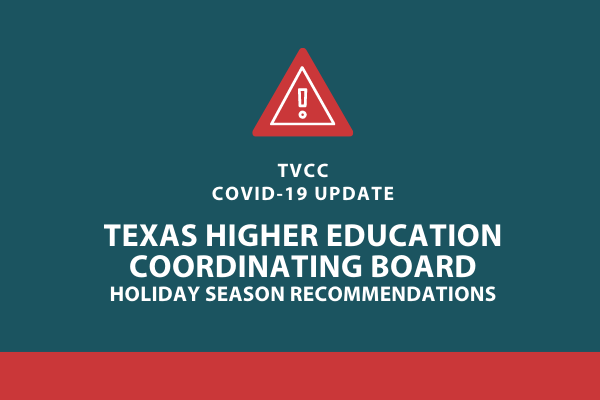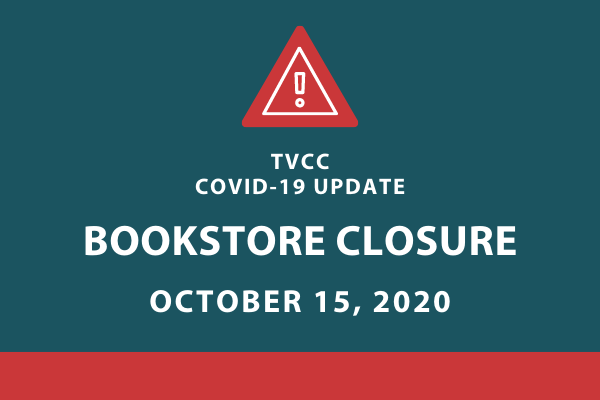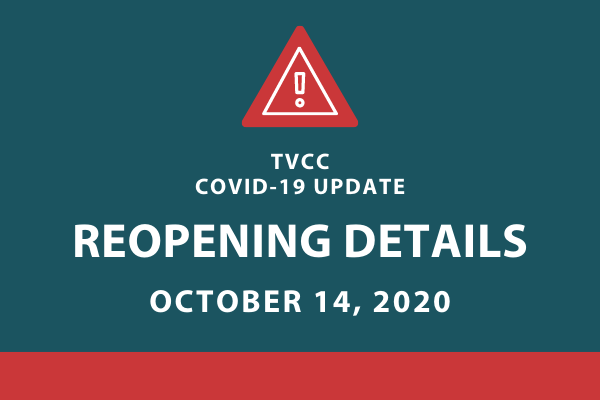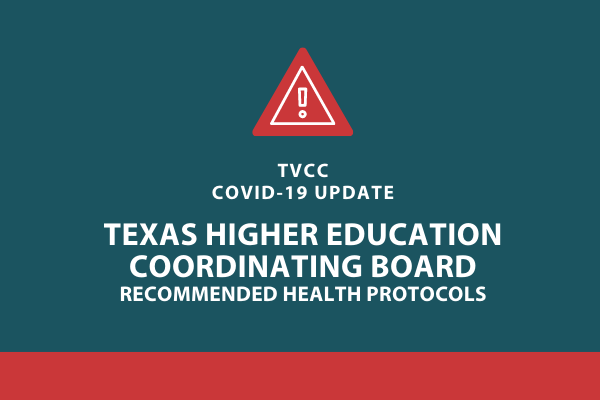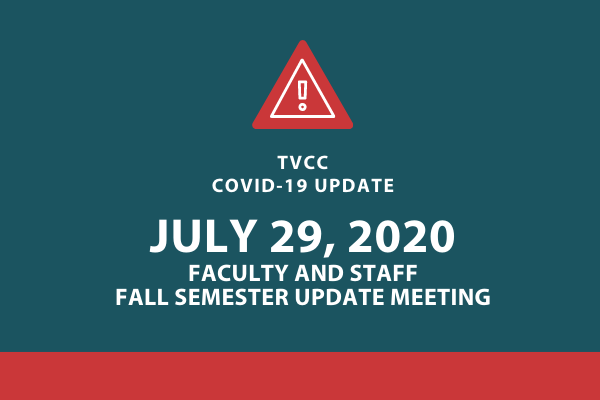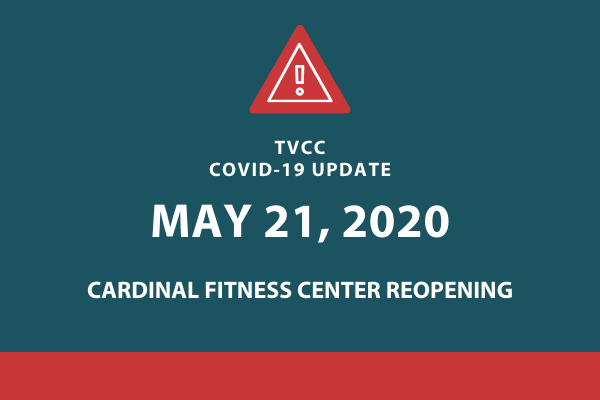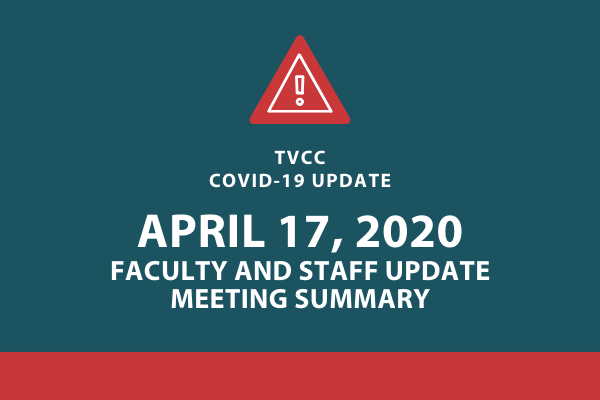March 12, 2020 Update
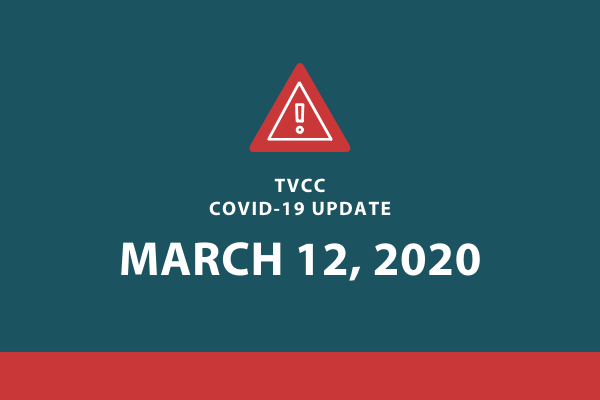
March 12, 2020 Update
TVCC is closely monitoring the situation concerning the coronavirus with reports from the Center for Disease Control (CDC), NET Health and other agencies.
The overall health and safety of our students and employees is our top concern. There have been many reports about school closures and alternate plans across the nation. Please understand that not all schools will have the same actions, as this pandemic continues to evolve and will be specific to what is happening within their specific region.
At this time, TVCC does not have plans to extend spring break, however, due to the fluidity of the event, this can change at any time. If the decision is made to make a change, the college will send out notification.
Human Resources will develop plans for alternative work scenarios as circumstances warrant. If you are in need of such a plan, please reach out to your direct supervisor,janene.dotts@tvcc.edu, or humanresources@tvcc.edu and someone will be in touch with you. These situations will be handled on a case by case basis.
We ask that if you experience any associated symptoms and/or are sick in general that you please stay home.
Changes in TVCC Operations
TVCC is implementing the following changes, effective immediately:
- TVCC will perform deep cleaning and disinfecting efforts at all campus/site buildings, and TVCC vehicles during spring break and immediately following. Disinfecting efforts will continue after we return as a continued preventive measure.
- TVCC has and will continue to display hygiene signage after the break and will strongly encourage students and employees to practice the recommended prevention steps as outlined by the CDC and other agencies.
- TVCC students residing on campus need to be aware that students on campus during spring break will not have access to dining services. If you are remaining on campus, please contact Harold Jones, director of housing at hjones@tvcc.edu or 903-675-6256.
- Campus dining (Aramark) has already implemented measures such as washing all silverware out in the common area every 15 minutes, utilizing disposable cups, not allowing cups in the cafeteria from the outside, removing salt and pepper shakers and napkin containers from tables, and other sanitation efforts around the clock.
- College-related air travel for employees and students will be suspended at this time for the remainder of the spring 2020 semester, unless approved by the president.
- TVCC is requesting that students, faculty, staff and administrators disclose information regarding any travel by them personally or by any individuals that live in the household about travel outside the state of Texas. We ask for your name, phone number, dates and location to which you traveled. Please email this information to hreid@tvcc.edu and/or janene.dotts@tvcc.edu.
- If there is any international travel, we will need those individuals to complete a phone health screening survey before returning to campus. Dr. Helen Reid will coordinate the screenings. Contact hreid@tvcc.edu or 469-614-3801 for more information.
- In an effort to help reduce the spread of respiratory viruses, including COVID-19, TVCC will enforce a 14-day restriction from the college for any faculty, staff, or student who travels or traveled to a CDC level 3 country during or after spring break until further notice. Please be sure to monitor travel closely on the CDC website to know if you will be traveling to such an area.
- If you know that you have traveled or will travel to an area with a high concentration of cases, we ask that you self-monitor for symptoms. Please contact hreid@tvcc.edu or janene.dotts@tvcc.edu if you are performing this measure.
- TDCJ faculty and staff will follow directives & protocols given directly by TDCJ.
Please know that there are NO known cases of COVID-19 on campus or with any employee or students. TVCC is taking preventive measures to help ensure the health and safety of our faculty, staff, students and communities.
Thank you in advance for your time, effort and response to this unprecedented event. In the end, this is a collaborative effort to ensure the health and safety of all of us.
We will continue to monitor the situation daily and provide updates as they become available.
For more information, please visit the CDC website.
Basic Virus information
Communicability
- The virus is spread mainly from person to person
- Between people who are in close contact with one another (within about 6 feet)
- Through respiratory droplets produced when an infected person coughs or sneezes
- Droplets can land in the mouths or noses of people who are nearby or possibly be inhaled into the lungs
- Contact with infected surfaces or objects
- It may be possible to be infected by touching a surface or object that has the virus on it and then touching the mouth, nose, or eyes
- This is not thought to be the main way the virus spreads
- Asymptomatic transmission
- Some spread might be possible before people show symptoms
- There have been reports of this with the new coronavirus
- This is not thought to be the main way the virus spreads
Signs and symptoms
Symptoms may appear 2-14 days after exposure:
- Fever
- Cough
- Shortness of breath
Children: There is no evidence that children are more susceptible. Limited reports of children with COVID-19 in China have described cold-like symptoms, such as fever, runny nose, and cough.
Prevention
Prevention for coronavirus is similar to preventive action for diseases like the flu, the common cold or other communicable diseases. Recommendations from the CDC include:
- Utilize social distancing: remaining out of congregate settings, avoiding large public gatherings and maintaining distance (approximately 6 feet) from others when possible.
- Avoid close contact with people who are sick.
- Avoid touching your eyes, nose, and mouth. (we typically do this 90x per day)
- Stay home when you are sick.
- Cover your cough or sneeze with a tissue, then throw the tissue in the trash.
- Clean and disinfect frequently touched objects and surfaces using a regular household cleaning spray or wipe.
- Follow CDC’s recommendations for using a facemask.
- CDC does not recommend that people who are well wear a facemask to protect themselves from respiratory diseases, including COVID-19.
- Facemasks should be used by people who show symptoms of COVID-19 to help prevent the spread of the disease to others. The use of facemasks is also crucial for health workers and people who are taking care of someone in close settings (at home or in a health care facility).
- Wash your hands often with soap and water for at least 20 seconds, especially after going to the bathroom; before eating; and after blowing your nose, coughing, or sneezing.
- If soap and water are not readily available, use an alcohol-based hand sanitizer with at least 60% alcohol. Always wash hands with soap and water if hands are visibly dirty.
- Try not to handshake. Use a fist bump, slight bow, elbow bump, etc.
- Use ONLY you knuckle to touch light switches, elevator buttons, etc.
- Lift the gasoline dispenser with a paper towel or use a disposable glove.
- Open doors with your closed fist or hip, try not to grasp the handle if possible, especially on office/commercial doors.
- Use disinfectant wipes at the stores when available, including wiping the handle and child seat in grocery carts.
These are everyday habits that can help prevent the spread of several viruses.
If you have further questions or concerns please contact Ruth Iverson, TVCC infection control officer at riverson@tvcc.edu, Dr. Helen Reid at hreid@tvcc.edu or humanresources@tvcc.edu.
